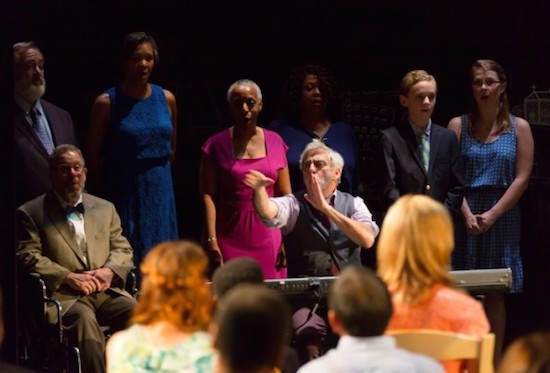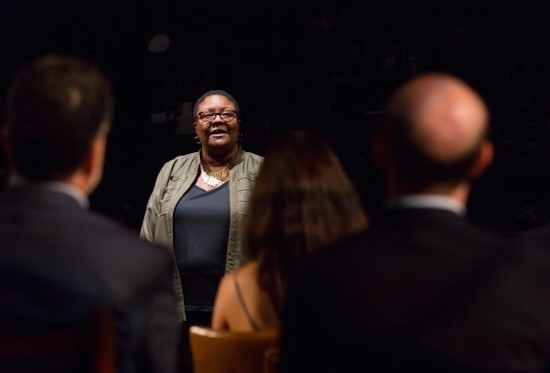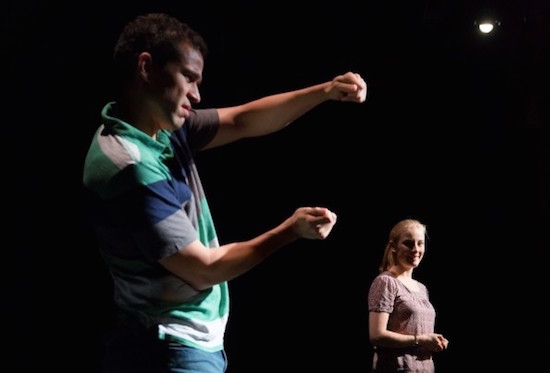
T. CHARLES ERICKSON PHOTO
Robert Dorfman as Simon Stimson, leading a choir of “townspeople.”
Gordon Edelstein’s new Long Wharf Theatre production of Our Town is a magically normal, splendiforously matter-of-fact, divinely human interpretation of a world theater classic that, for all its self-consciously naturalistic tendencies, has a latter-day reputation of being formal and stuffy. This rendition, honoring the Long Wharf’s 50th anniversary, is mortal, moral and resplendently casual.
Edelstein has let us visit this world before, in his similarly sparse-set, big-cast, low-key adaptation of Chekhov’s Uncle Vanya in 2007. The director (who’s been the Long Wharf’s artistic director for the past 11 years and was its associate artistic director for several years in the 1990s) also brought a lived-in quality to his exceptional production of Hecht & MacArthur’s The Front Page in 2006. A talent for working with large ensembles is a gift that many regional theaters can’t afford to receive; housing and feeding all those actors takes money, which is why so many new plays have three or less characters in them.

T. CHARLES ERICKSON PHOTO
But Long Wharf has gone all out to make Our Town a town. There’s none of the usual multiple-role nonsense, which means there are 21 professional actors onstage playing 21 characters, even if some of them only have a few lines
There are also over a dozen added “townspeople” for each performance, citizens of Greater New Haven who have been enlisted merely to add visual heft to the play’s already overwhelming feel of community. Each group of townsfolk turns up for one full week of the run. Their duties include standing en masse at the play’s beginning, mingling improvisationally throughout the second intermission, and sitting quietly in the cemetery during the third act. Those final scenes are augmented by a dozen photographic “gravestones” of deceased Long Wharf performers and benefactors. The photos include Edgar Rosenblum, the Long Wharf’s managing director from 1970 to 1996; longtime repertory company actors Bill Swetland and Joyce Ebert; founding board member Newt Schenk, after whom the main Long Wharf MainStage Theatre is named; and three Long Wharf supporters who died within the past few months: Ruth Lord (a co-founder of the theater), Claire Tow (who helped fund the Long Wharf’s recent renovations, and whose name is emblazoned on the mainstage) and Yale medical guru Sherwin Nuland, whose essay A Question of Mercy was adapted for Long Wharf by David Rabe in 1998).
So we really have three communities making up this diverse and distinctive Our Town. There’s Long Wharf past, Long Wharf present and the rest of New Haven. This isn’t the sort of self-serving celebration the Long Wharf dished up when Joyce Ebert co-starred in Arsenic and Old Lace there in 1995, and Bill Swetland and Sherwin Nuland were among the “corpses” dredged up in the comedy’s finale. Nor is it a traditional take on Thornton Wilder, as Long Wharf served up in 1988 when they hired archetypal old-school Stage Manager Hal Holbrook to helm a production marking the play’s 50th anniversary. No, this is deeper and richer than that. Edelstein and company honor Our Town by challenging it, by testing its limits, by bringing it closer to home.

T. CHARLES ERICKSON PHOTO
Myra Lucretia Taylor.
As this production’s Stage Manager (Myra Lucretia Taylor) informs us, “The first act was called ‘The Daily Life,’ the second act is ‘Love and Marriage,’ and the third act, I reckon you can guess what that’s about.” Taylor plays the Stage Manager as non-theatrically as possible; in her comfortable pants and vest, she behaves more like a greeter at Walmart. Few in the cast can match her laid-back beneficence, but some are so supremely skilled at underplaying their parts they come off as extraordinarily ordinary. Steve Routman plays a muttering academic who could have absent-mindedly wandered over from High Street. Gregoire Mouning (who, on the night I attended, had been promoted from the role of Man in the Graveyard to Constable Warren) is effortlessly charming, earning warm chuckles simply by quietly reacting to the grander movements of others.
This Our Town is full of exquisite little moments by coolly committed actors. In fact, it’s all little moments. Edelstein and his designers don’t overdo anything (and this is the theater that drove a Thunderbird car onstage to wind up a drama full of over-the-top impressions of ‘60s icons a couple of seasons ago). Much of the preview hype for Our Town has touted how every member of the cast has appeared in earlier Long Wharf shows, some dating back as far as 1986. What’s worth noting is that very few of them starred in those other shows. These are seasoned supporting players, invaluable character actors and, most importantly, exceptional ensemble types. They conform beautifully to the needs of Edelstein’s (and the great Thornton Wilder’s) community. Roles which are traditionally opportunities for upstaging and cheap laughs are neatly muted here: Robert Doorman as the choirmaster Sinon Stimson stumbles drunkenly, as he must, but not like a Red Skelton bum; his demeanor is tragic. Anne McDonough, who’s done ten previous Long Wharf shows (outdone in this cast only by James Andreassi, who’s done 11) gets to deliver the excited-old-lady-at-the-wedding lines. McDonough tempers the enthusiasm so it sounds sincere.

T. CHARLES ERICKSON PHOTO
Jenny Leona.
The balance and nuance of this production is remarkable, especially since the playing is so natural. Only the young couple at the heart of the play, Jenny Leona as Emily Webb and Rey Lucas as George Gibbs, get to toy with stereotypical melodrama. Leona, the milk-white beauty who was the lust object of last season’s Long Wharf production of Steve Martin’s/Carl Sternheim’s The Underpants, gets to once again be the China-doll romantic ideal. Lucas, whose previous Long Wharf role was The Boy in The Old Man and the Sea (and is reunited here with The Old Man from that show, Mateo Gomez, who plays Sam Craig) gets to act boyish and goofy and jumpy. But even this blissful couple are able to lessen the cliches and keep it real.

T. CHARLES ERICKSON PHOTO
Rey Lucas.
In this Our Town, we hear “Grover’s Corners, New Hampshire, 1901 – 1913” and see New Haven, Connecticut, 2015. It’s not as disorienting as it seems, no odder than when Derek Anson Jones and Doug Hughes set Shakespeare’s Much Ado About Nothing in 1920s Harlem (in 1999) or when Edelstein himself shifted Ibsen’s A Doll’s House to contemporary Fairfield County (2010). It works. All the references to horses and wagons made me think of New Haven’s industrial-age carriage manufacturers. When the newspaper editor Mr. Gibbs mentioned the area’s population being slightly larger if you measure it by the postal code rather than the town boundaries, I thought of Our Town‘s illustrious playwright, a Connecticut resident for half the 20th century whose Deepwood Drive house was just over the border in Hamden but which for decades bore a New Haven postal address.
Thornton Wilder, taught, studied, drank, dined and put on shows in New Haven. So have many of the folks in this Our Town. It’s a city’s tribute to a town, one theater institution’s tribute to another, and Gordon Edelstein’s tribute to a great bunch of actors and everyday people.